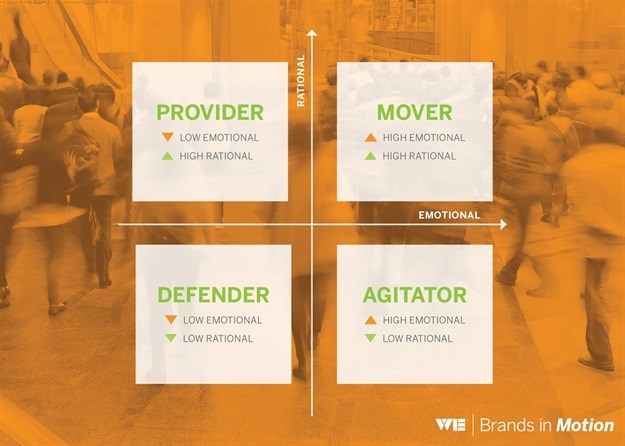The results from the WE Communications Brands in Motion 2018 global study have been released.

Image from WE Communications.
The data revealed that consumers worldwide continue to demand innovation — but now, in response to increasing technology-based fears, they’re attaching strong new stipulations to these expectations, chief among them the requirement that brands use technology ethically and responsibly.
“We are seeing some compelling year-over-year shifts in customer attitudes,” said James Wilson, GM of WE Communications in South Africa. “Consumers continue to have high expectations for brands to use innovative technologies, but most are afraid of how those same technologies might disrupt their lives. These fears are causing consumers to demand greater accountability from brands."
The study, conducted across eight global markets, examined both rational and emotional drivers that motivate customer choices within today’s environment — to decipher brand movement relative to geography, industry and key stakeholders. Three key themes emerged:
Consumers hold brands accountable to use technology ethically
Across the board, consumers indicated they continue to have high expectations for brands to use technology to drive innovation: nearly 50% of Brands in Motion 2018 global study respondents believe technology will either help do more things in less time or create greater sustainability. However, this year’s study also exposed a new precondition to consumer expectations: 97% said they now place responsibility squarely on brands to use technology ethically while continuing to drive customer-centric innovation.
"South African consumers are particularly demanding in their expectations for brands to continue driving innovation with technology: 68% of respondents thought that technology would allow brands and companies to do more amazing things in less time. 63% of South Africans expected technology to help brands be more sustainable (16% higher than the global average), whilst a significant 72% of South Africans expect brands to deliver an online experience to assess products and services (compared to the global average of 52%)," said Sarah Gooding, WE South Africa's deputy GM.
Consumers have been shaken by recent technology scandals and are anxious about the promises of unprecedented innovation. 84% fear their personal data is not secure, 67% dread being a pedestrian in a world of self-driving cars and 54% worry artificial intelligence will take their jobs away. In fact, 94% said that if brands can’t use technology ethically, then governments should step in. Consumers are giving brands an ultimatum: Self-regulate or be regulated.
Movement on the matrix: consumers want brands to show, not tell
From 2017 to 2018, average global scores of brand motion were up 16% for rational drivers and 14% for emotional drivers, showing that consumers' need for reason is outpacing their need to feel emotionally connected to a brand. In short, consumers are insisting brands deliver proof over promise.
When mapping these changing perceptions using WE’s Brands in Motion diagnostic tool — the Motion Matrix — the study revealed a notable uptick across every market but one, indicating customer expectations continue to grow at an exponential rate and it’s harder for brands to wow and delight consumers both emotionally and rationally.
Categories were not immune to these shifts. Computing devices, which previously had the highest consumer admiration, fell dramatically. In contrast, smart home — the category that seems like it would have the most to lose in conversations about tech disruption, data privacy and security — is ascendant. Despite 63% of respondents saying they were afraid their phone was listening to them, and 84% fearing their personal data wasn’t secure, smart home-made huge year-over-year gains in 4 of the 6 markets in which it was surveyed.
Collectively the data signals that although the tech halo is strong, consumer anxiety over disruptive technologies and reactions to technology misuse may be stronger. These fears could continue to be a negative influence on tech-heavy categories unless they start to anticipate and get ahead of consumers’ ethical expectations.
Global environmental forces drive increasingly polarised perceptions of brands
With the prevailing societal backdrop of trade tensions, political unrest and technology angst, consumers are raising expectations for greater rationality and responsibility in their relationships with brands. Not only are people expecting more from brands than ever before, they are also more binary in their reactions to brands and categories.
The study found that in 2018, brands and categories are primarily clustered in two quadrants of the Motion Matrix — mover and defender — and the higher average scores mean it’s harder than last year to be a mover. This shift indicates that consumers around the globe are reserving their greatest love and appreciation for a smaller number of brands and that they have strong convictions — one way or the other — about both sectors and brands. As a result, the issue of brand value has become very stark and polarised, making it harder for competitors of a beloved brand to draw their share of consumer affection.
“Consumer sentiment isn’t surprising if you look at the current global environment — from Facebook’s Cambridge Analytica scandal, current struggles with content moderation and the GDPR, to the competing promise and apprehension attached to technologies like AI, blockchain and autonomous vehicles,” said Alan VanderMolen, WE’s president of international.
Brands have become the middleman, keeping the peace between lightning-speed innovation on one side and thoughtful ethics and regulation on the other. Consumers have now upped the ante and expect them to do more to drive stability in progress.
“The Brands in Motion 2018 global survey data and corresponding insights present brands with a tremendous opportunity,” continued Wilson. “With awareness of how customer perceptions, attitudes and demands have changed year over year, they better understand the forces of motion, their corresponding impact, and where they can capitalise to better reach their most important stakeholders.”
































